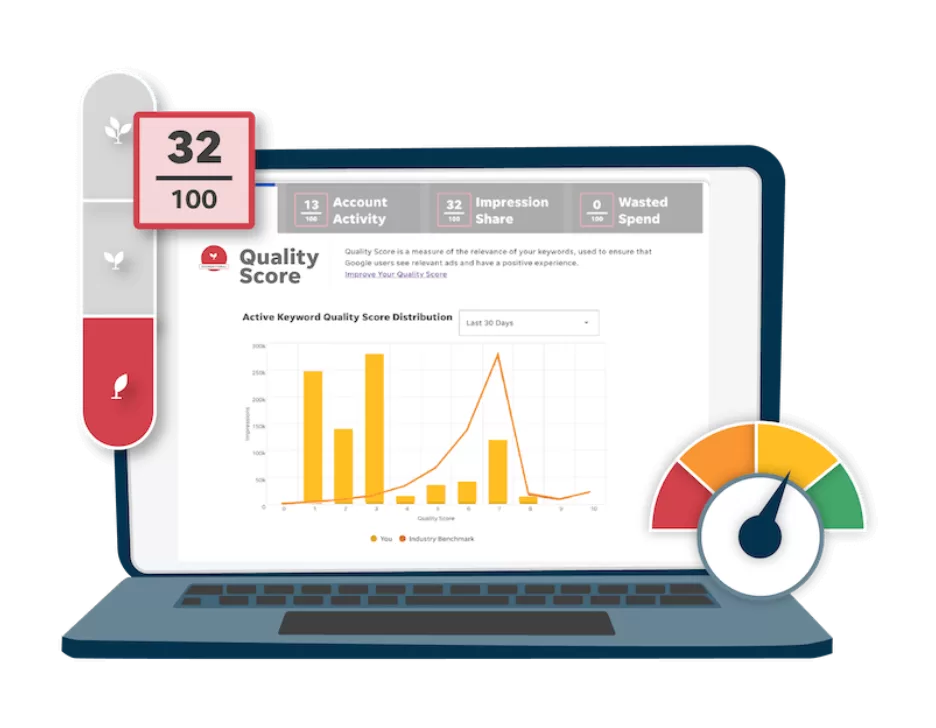Whether you’re a seasoned digital marketer or brand new to the world of SEO, you’ve likely heard about Domain Authority (DA). The DA metric has a long history in the SEO industry, and many SEO strategists use it to understand and quantify the ranking potential of websites.

But what exactly is Domain Authority and how important is it to your own SEO strategy? Domain Authority is not just for the SEO nerds, and anyone who wants to rank higher in search results can benefit from having a more nuanced understanding of this site authority metric.
In this article, I hope to demystify Domain Authority by answering the following questions:
- What is Domain Authority and how is it calculated?
- What do I really need to know about Domain Authority?
- How can I increase Domain Authority?
- How can I use DA in my SEO strategy?
What is Domain Authority?
Domain Authority is a metric created by Moz, an SEO software, that quantifies how likely a website is to rank in search engine results. Domain Authority is on a 0-100 scale with higher scores predicting stronger ranking potential.
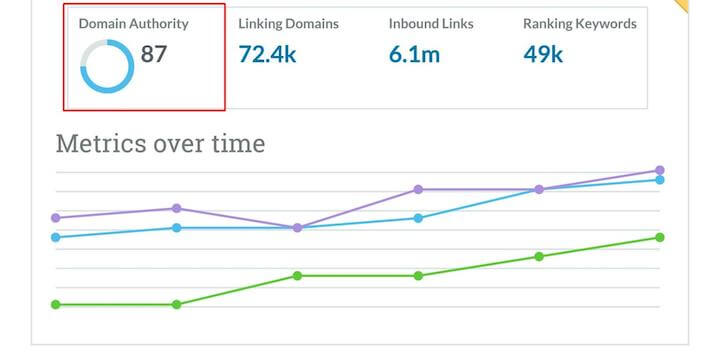
Curious about the Domain Authority score for your own website? Check your score with this free Domain Authority checker.
How is Moz Domain Authority calculated?
There are several factors that Moz uses to calculate DA, but the most significant is the inbound links pointing to your domain, also known as backlinks.
Moz gathers this information from its constantly updated Link Explorer index. Sites with more backlinks and unique referring domains are more likely to have higher DA scores.
You can read all about the math behind Domain Authority in Moz’s Authority Scoring Guide. But to keep it as simple as possible, it’s all about your backlink profile.
What is a Good Domain Authority score?
Because Domain Authority is on a 100-point scale, it can be tempting to categorize certain scores as “good,” or “bad.” But earning a perfect DA score is a nearly impossible feat that only the biggest, most popular of websites have ever earned.
That’s why Moz emphasizes that this metric is comparative. Websites with low DA scores can still and often do rank high in search engine results.
Let’s say your website has a DA of 25. That may be lower in comparison to the millions of other websites out there, but if that score is higher than your competitors, then you can most likely outrank them for important keywords in your industry.
In other words, a good Domain Authority score that is higher than the domains you hope to outrank.
How to check Domain Authority
Curious about the Domain Authority score for your own website? You have lots of options. Here are just three:
- Moz’s Domain SEO Analysis Tool
- Linkgraph.io’s Domain Authority checker
- Ahrefs’ Website Authority Checker
Domain Authority: what you really need to know
So what do site owners or digital marketers actually need to know about Domain Authority?
If your main goal is to simply earn new customers from search, it isn’t mandatory to understand the ins and outs of this calculation. However, Domain Authority has loads of direct applications to crafting a successful SEO strategy. Here are the most important things to understand about this site authority metric.
1. Domain Authority is not a ranking factor
Although DA can help quantify ranking potential, it has no part in Google’s ranking algorithm.
This is why newer or smaller websites with lower Domain Authority scores’ can still outrank competitors if they create high-quality, informative, fresh, and relevant content for users.
However, some of the factors that Moz uses to calculate Domain Authority are Google ranking factors, like the number of linking root domains and number of linking pages. As a result, there is often a positive relationship between DA scores and other SEO performance indicators like keyword rankings, average position, and organic traffic.
2. Domain Authority is not the only site authority metric
Moz’s Domain Authority is not the only site authority metric available to SEOs. Other big SEO brands and keyword research tools with large link indexes have developed their own authority metrics. Some you may recognize include:
- Majestic’s Citation Flow
- Semrush’s Authority Score
- Ahrefs’ Domain Rating (DR)

DR (domain rating) is Ahrefs’ Domain Authority metric.
And because each of these brands uses its own unique calculation and link indexes, your website’s scores could vary widely for each metric.
For example, the below Domain Rating vs Domain Authority scatter plot compares Ahrefs DR and Moz DA scores approximately 9,700 domains. The upward trend shows that the site authority metrics have a positive relationship with each other.
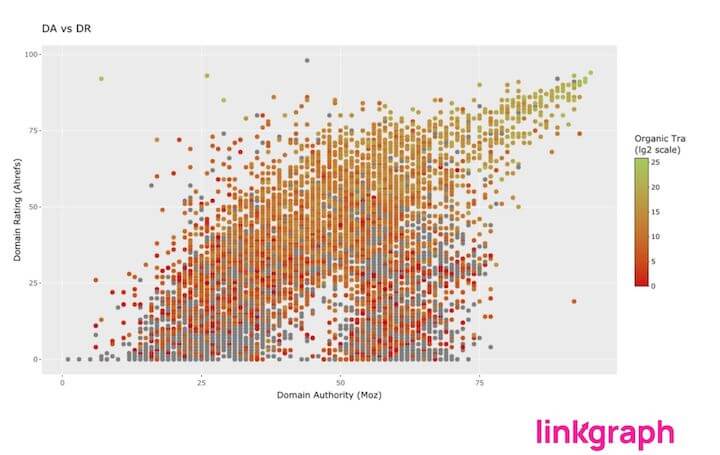
However, the data also shows that there are times when DA and DR scores can widely differ for the same domain. The group of domains where DA scores are significantly lower than DR scores may be because Ahrefs’ considers both the quality of links and the authoritativeness of referring domains in its DR calculations.
So although DA is arguably the most widely used authority metric in the SEO industry, it is by no means the absolute truth of ranking potential. it’s important to note that there are other ways to understand the health and ranking potential of your website beyond DA.
Use LOCALiQ’s Free Website Grader to see if your site is optimized to rank.
3. Google’s PageRank is the original authority metric
Long before Domain Authority was on the SEO scene, Google’s PageRank was the original authority metric.
Google used to publicly display the PageRank of web pages in its toolbar, but because black-hat SEOs exploited that information to help their rankings, Google now keeps PageRank scores under lock and key.
Essentially, every time a page links to another, it passes along a portion of its PageRank (or link equity). That means that pages with lots of backlinks will pass along more PageRank than others. It looks something like this:
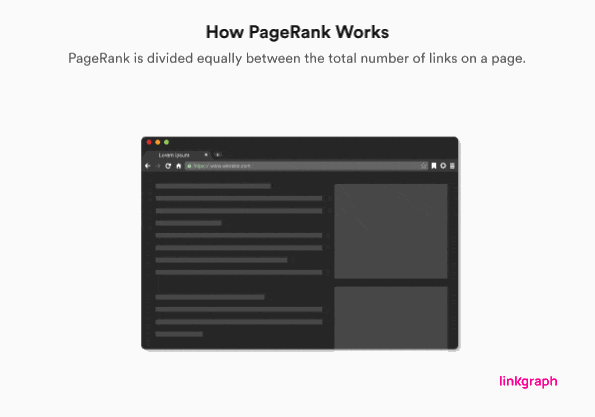
Unlike Domain Authority, PageRank is actually a ranking factor that Google relies on when promoting web pages. So although Google no longer gives us direct insight into PageRank, site owners need to realize that every hyperlink is still passing along PageRank (or link juice) throughout the internet.
4. Improving Domain Authority & off-page SEO go hand-in-hand
Because the Domain Authority calculation primarily relies on backlinks, off-page SEO strategies like link building and digital PR are really the only way to elevate site authority metrics like DA.
Although improving on-page SEO will always be a worthwhile endeavor for improving your relevance and quality in the eyes of Google, on-page optimizations won’t directly influence your DA like backlinks will.
However, with higher-quality content on your website, earning backlinks through off-site strategies will likely become far easier. In general with SEO, a multidisciplinary approach is likely to be more effective than relying on a single strategy on its own.
How to increase Domain Authority (safely)
Because DA is calculated primarily through backlinks, off-site strategies like link building are the best way to try to improve your score. But this is not as easy as it sounds, as we have no control over whether or not another website chooses to link to ours.
Also, some link-building strategies are considered “black-hat,” meaning your website can be penalized by Google if it appears to be paying for backlinks or engaging in spammy link practices.
But there are plenty of ways to safely increase the overall authority of your domain, and as a result, your DA scores. Below are some of my favorite link building strategies because they are both effective and Google-compliant.
1. Get listed in directories
For small and local businesses, getting your domain listed across online directories is both a high-impact and cost-effective (under $100) way to increase your DA. Here are the best 10 directories to start with.
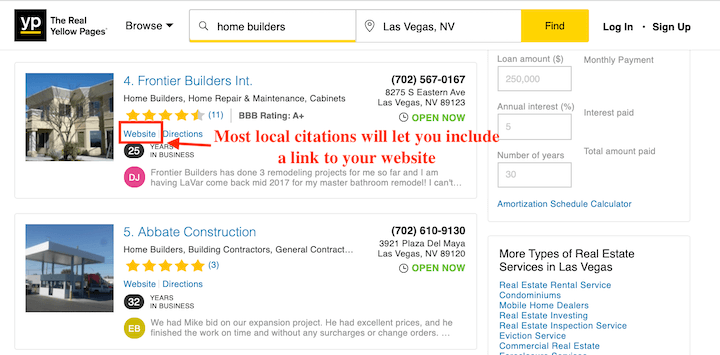
Local SEO strategies like citation building are some of the most affordable growth strategies you can try. Not only will Google better understand the markets and areas you serve, those links back to your website will help elevate your DA scores over time.
For more help with local SEO, head to LocaliQ Marketing Lab’s free Local SEO course
2. Write great content
First and foremost, focus on making your content so good that other sites will discover and link to it naturally (think E-A-T). Write a great keyword-targeted post that ranks, and a blogger or business looking to write about that topic will discover your post in their research and hopefully link back to your site in their post. I say hopefully because if the information you’ve provided is common knowledge and there’s no way to prove that the writer got this information from your page, the less likely you are to get a citation.
But if you share original research or a thought leadership piece on the topic—something that is hard to replicate— the more likely you are to get that backlink. You can take this approach for high-volume keywords or super-niche topics. Just be sure to promote on social media to get more eyes on it.
3. Contribute guest posts
Contributing blog content, original research, or thought leadership to other relevant, high DA websites in your industry is also a great way to earn more backlinks to your website, and thus elevate your DA.
Publishers are always looking for great content, and if you provide that content for them, you not only elevate your brand expertise but will often earn a backlink to your website in the byline—or even in the body of the post.
To elevate your Domain Authority faster, seek out guest blogging opportunities in industry-specific publications that have topical relevance to your own. For example, the below chart shows the topical relevance of my own brand’s website in comparison to one of our top competitors.
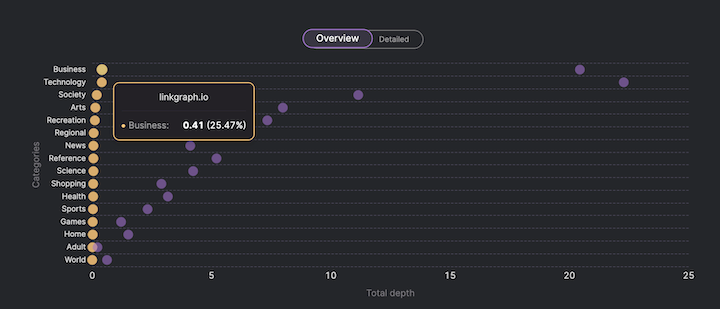
Topical Relevance of Backlink Profiles as seen in SearchAtlas
The majority of our competitor’s backlinks come from websites related to Business and Technology. Because we want to elevate our Domain Authority to be higher than theirs, we focus on earning guest blogging opportunities from websites with the same topical relevance.
4. Invest in public relations
Having a public relations team can benefit any-sized business, but for enterprise-level brands, earning links in well-known publications is key to competing against other websites with really high Domain Authority scores.
In terms of your overall brand awareness, press coverage that doesn’t include a link can still have some positive SEO return because Google looks to off-site signals like brand mentions to understand your website’s authority. But for raising DA specifically, dofollow links from top-tier publications will be what ultimately has an impact.
If you’re a small or mid-sized business that doesn’t have the resources for a PR team, consider signing up for Help A Reporter Out (HARO). This service connects reporters to industry experts and can be a great way to earn high-quality linking opportunities.
5. Try broken link building
Although a more advanced strategy that will require the use of backlink tools, broken link building can help you find link opportunities to elevate your DA scores. The process is as follows:
- Use a backlink analyzer tool to find broken links on other websites.
- Create content that can serve as a replacement for the missing resource (or identify that existing content on your website).
- Reach out to the editor and offer your content as a replacement.
Other ways to use Domain Authority in your SEO strategy
Beyond an authority flex, you can also use Domain Authority scores to develop a highly-targeted SEO campaign. The comparative nature of DA can help you set realistic goals and benchmark your own SEO performance.
1. Choose keywords according to DA
When it comes to choosing the right keyword targets, DA can be a useful metric for knowing whether or not your website can realistically compete with those pages already ranking on page one.
I recommend optimizing your web pages for keywords with a Keyword Difficulty score less than or equal to your Domain Authority. For example, if you want to rank for the keyword “coffee subscription boxes,” it will likely take at least a DA of 60 to rank on the first page.
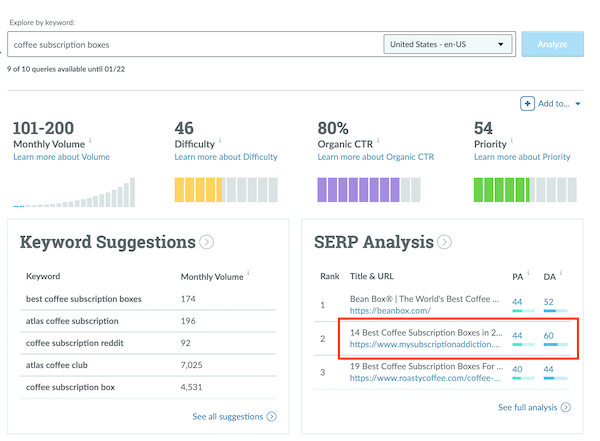
This is not an absolute barometer, but it can be very helpful for identifying lower-competition keywords that will bring your website organic traffic in the short term while you build up your Domain Authority over time.
2. Identify your SEO priorities
Because DA is a comparative metric, one of the best ways to use the score is in thinking about your competition.
For example, if your DA is already higher than your competitors, high-quality content alone will likely get you to page one. That means it would be better for your team to invest your resources in on-page optimizations, which are more affordable and can often be done in-house.
The reality is, off-site SEO is usually more time, resource, and cost-intensive. If there is still a significant gap between your Domain Authority and your competitors, then being aggressive with your off-site strategy will be a must-do if you want to compete and make your website more visible on Google.
3. Pay attention to Google’s guidelines
While Domain Authority isn’t an official ranking factor (again, it’s a Moz metric), it is a representation of two things that are: E-A-T and backlinks. In Backlinko’s guide to SEO in 2022, Brian Dean points out that Google’s Quality Rater Guidelines says the creator of the main content plays a role in your ranking. This means making sure your blog authors are experts in the topic being covered and have bylines that say so, and that Google can learn as much about your website’s expertise and authority as possible through your about page, contact page, privacy policy, and terms of service.
Increase Domain Authority, improve your ranking
In some ways, Domain Authority can feel like a bit of a status symbol in the world of SEO. Really high DA scores are impressive and not easy to get, but remember, your SEO success is not limited or defined by your Domain Authority.
Still, improving DA is worthwhile because it relies on factors that are essential to ranking well in Google, and ranking well in Google means more traffic to your site. To show Google that your domain is authoritative and well-trusted by other websites on the internet, follow the steps covered in this post to increase your Domain Authority:
- Get listed in directories
- Write great content
- Guest post on other sites
- Invest in public relations
- Try broken link building

